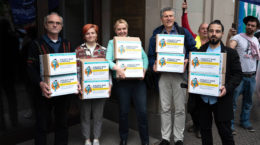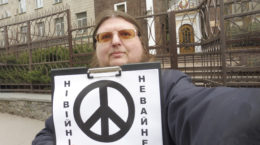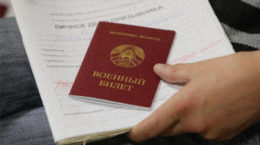Berlin’s domestic intelligence agency („Verfassungsschutz Berlin“) is watching one of the few organizations from the German peace movement that has been opposing Russia’s criminal war of aggression since the beginning of the Russian invasion. This is evidenced by the secret service’s annual report („Verfassungsschutzbericht“), which was published on June 27. In the report, the secret service takes issue with two imaginative and striking protest actions against Gazprom and the Russian Embassy, organized by Antimilitarist Action Berlin (amab) in 2022. „We joked that the Russian secret services would certainly take interest in our actions,“ says Jan Hansen, spokesperson for Antimilitarist Action Berlin (amab): „But it’s a scandal that the Berlin secret service is watching us because of protests against the Russian war of aggression and its profiteers!“

Antimilitarist Action Berlin (amab) is a group of young people who are committed to opposing war and rearmament. „That’s why it was natural for us to raise our voices against the Russian war of aggression right from the start.“ Just a few days after the invasion, Antimilitarist Action Berlin protested in front of Gazprom’s headquarters in Berlin. There, the group symbolically sawed a gas pipeline in half and demanded the immediate closure of the gas pipeline Nord Stream 1.

Stop Gazprom
The activists decorated the entire street with banners and signs displaying a modified Gazprom logo on, having replaced the lighter with a rocket. Residents also placed the posters in their windows. In addition, activists dressed as construction workers symbolically sawed a cardboard pipeline in half. „Instead of rearming the German military, we must stop the flow of money to Russia, because it finances the war in Ukraine,“ Antimilitarist Action Berlin wrote in its statement on the action. Jan Hansen, spokesperson for Antimilitarist Action Berlin (amab), comments: „The Berlin secret service classifying our registered protest as ‚extremism‘ is pure despotism and a real threat to the democracy it is supposed to protect.“

Body bags in front of the Russian embassy
Another protest action of Antimilitarist Action Berlin might have creeped out the employees of the Russian Embassy in Berlin „Unter den Linden“ and of the Russian Cultural Institute in Friedrichstraße. Antimilitarist Action Berlin placed black trash bags around the embassy. The trash bags were made to resemble body bags and labeled with „Z-200“. The group’s statement explained: „The Russian government is waging a murderous and criminal war of aggression in Ukraine. We call on the employees of the Russian embassy to do everything in their power to make their government stop the war and withdraw their army from Ukraine.“

Berlin secret service monitors Putin opposers
The actions scared not only Gazprom and the Russian embassy, but also Berlin’s secret service („Verfassungsschutz Berlin“). This became apparent with the publication of the secret service’s annual report („Verfassungsschutzbericht“) for 2022. In the special chapter on political reactions to Russia’s war in Ukraine, the secret service names the actions of Antimilitarist Action Berlin among various other actions in the section „Left-wing extremism“ on page 22: „There were isolated protest actions in front of, and damage to, property at Russian facilities and companies. The corporate headquarters of ‚Gazprom‘ were repeatedly attacked in February. In October, there were two incidents of damage to property (placement of alleged body bags and throwing of paint bags) in front of, or at, the Embassy of the Russian Federation.“ Jan Hansen comments: „Even though our group is not mentioned by name: When mentioning the few protest actions at Gazprom and the body bag action, the secret service can only have Antimilitarist Action Berlin in mind. Because we were active when most of the German peace movement was still silent.“
Who are Antimilitarist Action Berlin (amab)?
Antimilitarist Action Berlin were founded in 2018 and has around a dozen members. „We wanted to do something against war and militarization, but were fed up with the German peace movement,“ says Jan Hansen. Anti-Semitism, toxic masculinity, outdated world views from the Cold War, a staggering lack of criticism of human rights violations in Russia, regular exaggeration of the number of participants at peace rallies, marching together with neo-Nazis, and the like, left amab’s members with an unfavorable image of the peace movement. „That’s why we set up something of our own.“

Events, trips and actions
Since then, the group has organized events on topics such as anti-Semitism and right-wing alliances in the peace movement, and on the current war in Sudan. The group’s trips to international events like the UN’s conference to ban nuclear weapons in Vienna or the World Peace Congress in Barcelona are popular. Time after time, the group positions itself against the spread of conspiracy narratives in the peace movement. Depending on the university schedule, the group also organizes protest actions: „For example, we have been demanding climate protection instead of rearmament, and asylum for conscientious objectors from Russia, Belarus and Ukraine.“

Controversial reputation
„We have worked hard to earn our controversial reputation within the German peace movement,“ says Jan Hansen. A few peace activists, especially from „German Peace Society – United War Resisters (DFG-VK)“, appreciate the group’s commitment against the Russian war of aggression and support the young activists‘ work against anti-Semitism, sexism and racism in the peace movement. Others resent amab’s reports because they relentlessly criticizes the presence of Nazis at peace protests and the use of Russian propaganda narratives within the German peace movement. Amab’s reports also provide realistic assessments of the size of peace demonstrations. „Our egos are charmed by the secret service attesting our importance,“ says Jan Hansen, spokesperson for Antimilitarist Action Berlin (amab). „Finally, peace work is exciting and fascinating again!“
What is a „Verfassungsschutzbericht“?
All 17 German domestic intelligence services issue annual reports. These are euphemistically called „Verfassungsschutzbericht“ (Report on the Protection of the Constitution). The foreign intelligence service „Bundesnachrichtendienst“ (BND) does not publish annual reports. The Military Counterintelligence Service (MAD) tried it for the first time in 2020, but one of the would-be James Bonds involved extended the borders of the state of Jordan to the Mediterranean on a map in the publication. Since then, the Defense Ministry has dispensed with annual reports from MAD.
Consequences?
Being mentioned in the secret service’s report has indirect and hard-to-predict consequences. Being noted in the report is akin to an enemy declaration. It signals to other state authorities that they do not have to exercise any restraint when dealing with the groups in question, since they are almost „terrorists“. Additionally, banks can cancel an affected person’s accounts, other countries can refuse them entry, and it can affect chances of employment. Furthermore, the secret services try to drain the affected groups of support from civil society. „After all, who wants to be the next organization under observation of the secret service?“ states Jan Hansen.









